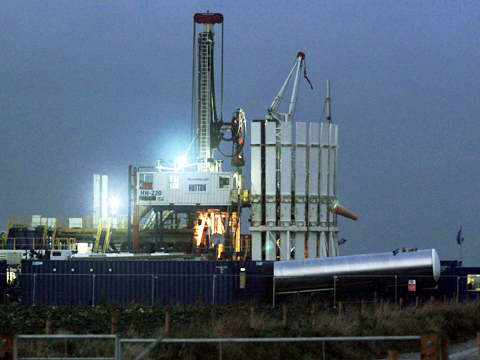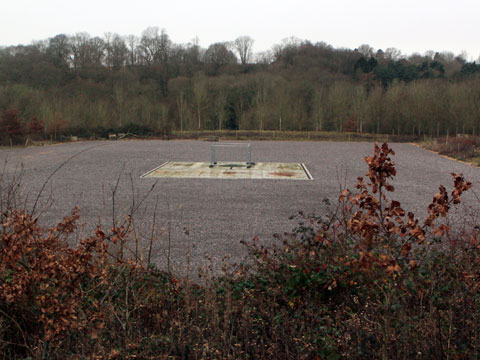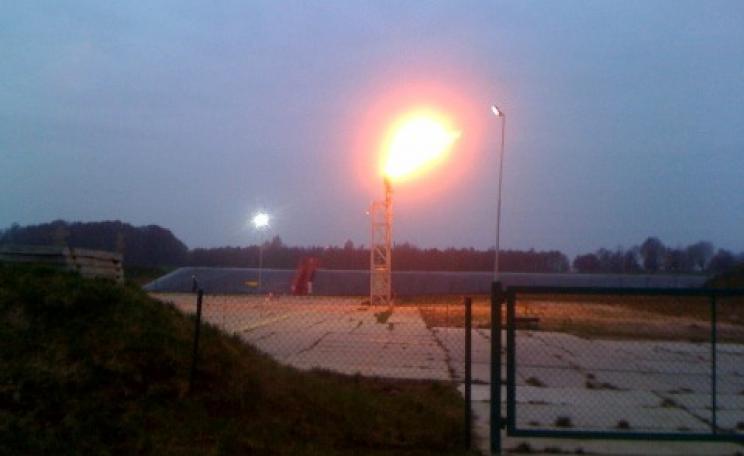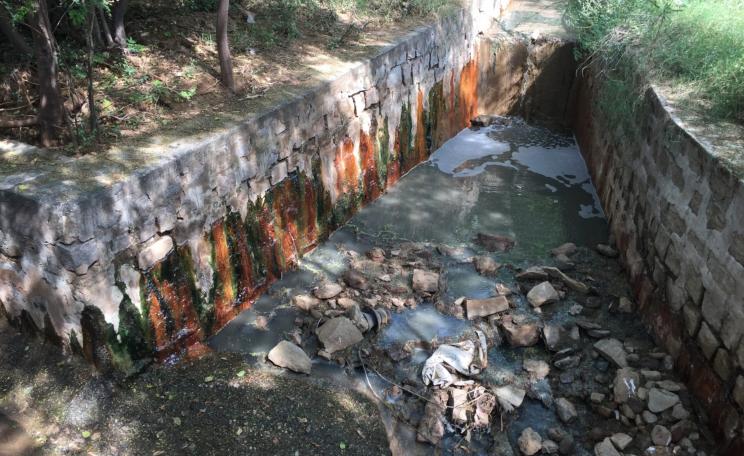Chris Faulkner is an oil man. From Dallas, Texas. And his company, Breitling Oil and Gas, is a major player in the burgeoning shale gas sector.
Faulkner is in London to give a presentation on whether Europe is the next shale gas hotspot, and to ask whether – if so – it has the necessary infrastructure to cope with a US style 'dash for gas'.
But he's also here to explain how the controversial process for extracting underground shale gas reserves – hydraulic fracturing, or 'fracking' as it has become known – can be green.
Contrary to the myths spread by environmentalists and parts of the media, the oil man contends, injecting – at high pressure – a mixture of water, sand and chemicals deep into the earth to release gas reserves is not in itself bad for the environment.
Instead, Faulkner believes, the oil and gas industry has done a poor job in marketing itself and in managing its public relations. This has, he argues, enabled others to speak for the industry, to capture the media agenda, and to spread alarm.
“The image of lighting your water faucet on fire [a key sequence in the anti-fracking, Oscar nominated film Gasland] has become the viewpoint or the image of fracking around the world. Now the reality is the media loves sensationalism and that has now transcended the entire scientific evidence that says that fracking is safe,” he says.
The Breitling CEO does acknowledge that fracking has impacts. But he claims to have developed a programme – Envirofrac – to evaluate environmentally safe fracking procedures, thus helping to combat the problem.
“Fracking can be green. The environmental impacts of fracking can be effectively curtailed through a combination of technology innovation and smart regulation,” Faulkner says in the press release sent out ahead of his London visit. “The focus must be on water conservation, earth preservation, and air quality monitoring.”
But these are not terms environmentalists normally associate with fracking. In the US, the issue has become a key battleground between green campaigners and the energy industry. One of the biggest – and most bitter – such scraps of recent years in fact.
Advocates say fracking is safe (for people and the environment), secures a domestic gas resource to help boost energy security, provides jobs, and helps bring prosperity to sometimes impoverished communities.
Critics say fracking is dangerous (for people and the environment), unnecessary, and the latest example of corporate America trampling over the rights of ordinary people.
They argue – supported by a growing body of evidence, it seems – that fracking involves an unacceptable level of water usage, contaminates water supplies and spills potentially toxic waste fluids into the environment.
They also say the process uses an unsavoury mix of chemicals – including known carcinogens – and is a cause of air pollution, traffic congestion, noise, and a host of other problems.
Campaigners fear too that the shale gas boom will divert attention away from the search for alternatives to fossil fuels, thus potentially derailing efforts to tackle climate change.
Most recently, media reports have linked fracking to illnesses in livestock in a number of US states, including Pennsylvania, raising fears about food safety.
Slick talk
Thousands of miles from Pennsylvania, in a tiny hamlet called Ogonki, in an area of northern Poland known as Kashubia, it is reports such as this which worry Edward Sawicki.
Sawicki is a farmer. A small scale organic producer with less than a dozen cows. His farm sits in a picturesque, rural area of rolling hills, pristine woodland and winding country lanes. The fields and forests give way occasionally to tiny villages, farms, and manicured churches. The kind of place where shops don't open on Sundays.
Kashubia isn't officially independent from the rest of Poland, but many of its inhabitants would like to think it is, with their own dialect, flag and fiercely independent spirit. It's where some Poles take their vacation. The area has many summer houses and lakes, used for swimming or fishing.
Sawicki is worried because the ground underneath him contains shale gas, and gas companies want to drill for it.
In late 2011, industry representatives began visiting inhabitants in the region, Sawicki says, trying to secure permission to carry out geological surveys.
The gas men came armed with pamphlets and brochures and slick talk, trying to persuade people that fracking was safe. But whilst some farmers in the region were quick to allow access to their land, Sawicki refused, worried by what he had read.
“I mean, the first threat when it comes to hydraulic fracturing and numerous drillings regards our water, what will be done to test our drinking water..,? the farmer asks.
“Secondly, how the air that we breathe is going to be treated, I mean, how the gas is going to be treated, the remains from the mining, not, as the government says green gas, but all the mess that will stay here.”
Keen to illustrate what he believes is at stake, Sawicki takes us down through the freezing fields to the shoreline of a healthy-looking lake. There's lots of trees and greenery all around, and some log cabins nearby, some wild birds floating on the water – the sort of place in summer where you could idle away an afternoon.
“I am the owner of this land, here, in this direction and that,” he asserts. “The forest and meadows belong to me. My property border is at the lake that is behind me. The lake is quite big, it stretches for 7 km. One of the fishermen I know fishes here in the lake, so it is still quite clean.
“My fear is that oil stains may appear on the surface if some trucks that carry chemical stuff... [lose their] content deliberately in our forests or in our watercourses here, and the lake might disappear altogether.”
Back at the farmhouse, Sawicki tells us his opposition to the exploratory drilling has come at a price. “It all started when seismic companies, the ones who have been commissioned by the [gas] exploitation companies, started [to] intrude on us last year... and it was not only intrusion, it was harassment and terrorising, threatening with expropriation, financial fines, different things.”
He says no more – it is too complicated to go into any detail, he explains – but our interpreter later tells us there's been phone calls and threats.
Sawicki shows us an anti-fracking mural he's had painted on the side of a barn. Although it cannot have been seen by many people in person – Ogonki is isolated, with few, if any, folk passing through – the mural has been filmed and photographed by all the visiting journalists.
The painting, via this unexpected route, has thus reached thousands, perhaps millions.
Jobs and prosperity
There should be lots of people living in Kashubia, and indeed across Poland, worried like Edward Sawicki. But Poland has embraced the US 'dash for gas', and its own shale gas potential, in an enthusiastic manner not seen elsewhere in Europe.
Both the authorities and, according to some polls, a significant portion of the public, are in favour of gas development. They hanker after the promised foreign investment, the jobs, and the prosperity which will follow – it is claimed – the expected gas boom.
The country is certainly sitting on a vast shale gas reserve – initial figures put this at over 5 trillion cubic meters, later massively downgraded but huge all the same – and the government knows it is valuable.
So far, just over a hundred exploratory concessions have been awarded to energy firms (both Polish ventures and joint Polish-overseas partnerships) to drill and help ascertain for certain just how much gas is available – and where.
Officials have carved up vast swathes of the countryside and made it available to the circling prospectors.
Exploratory drilling has not yet begun at the majority of sites however. Legislation expected to be finalised later this year will provide the necessary framework for full scale extraction to begin – the “green light” for the gas rush as it is being seen by some.
The government wants laws in place to tackle the thorny issues of environmental protection and taxation, particularly after several EU reports warned of the potential risks associated with fracking.
Breitling Oil and Gas has recently explored potential investments in Poland's shale gas sector. Although Chris Faulkner says the future “looks bright”, he is cautious about whether the country is yet ready, believing it to only have a “very rudimentary” framework in place.
“Poland and other countries need to build a regulation framework that we know as oil and gas companies,” he says.
“What are the requirements to go into Poland and drill a gas well and frack it? What are the permitting requirements? What are the assessments? The environmental assessment requirements? What are the emergency assessments if we were to have a spill or if some kind of issue happens, you know, what are those procedures?”
A growing body of green campaigners, including big guns from Food and Water Watch and Friends of the Earth, are gathering in opposition too. They downplay the assertion that Poland will benefit, economically or otherwise, and point to the environmental red flags being waved from across the water in the US.
“Despite the Polish government’s glossy propaganda Polish people have not bought the alleged benefits of shale gas and, like the rest of Europe, are rightly sceptical about the benefits the gas industry claims it will bring,” Antoine Simon, from Friends of the Earth Europe, says.
“The European Parliament and European Commission recently questioned the European dash for gas and highlighted the numerous high risks associated with the extraction of shale gas. Concerned communities in Poland and across Europe are taking action against this dangerous experiment on health and the environment.”
Livelihoods and future
In the village of Nowy Dwor Bratianski, deep in the bleak Polish countryside a long, twisty drive from the city of Gdansk, Barbara Grzybowska and Mieczyslaw Rutowski have found themselves on the sharp edge of the country's looming gas boom.
Like Edward Sawicki, they are farmers, and worry how the arrival of an exploratory drilling rig nearby will affect their environment, particularly if water usage surges. “If it turns out that there is [a] shortage in water supply, our animal farming, our existence is really in danger,” says Rutowski, looking out across the hillside.
They explain in passionate detail how they sow crops at certain times of the year to maximise retention of valuable water resources, and ensure the best output from the unforgiving soil.
These are people who know the land and its natural cycle, and fear that meddling by outsiders could damage, irrevocably, their livelihoods and future. What has alarmed the farmers most however is just how little information they say they have been given about the drilling.
“We, the local residents are not a party in this deal. We haven't been informed at all about the planned construction... even on the village bulletin board where all ads are customarily published there was no information about building the drilling rigs,” says Rutowski. “There was some information about construction of the access road but it was not stated that there will be a drilling rig.”
The farmers accuse the local authorities – as well as the gas company involved – of effectively steamrollering the development through by allowing just two weeks for objections to be filed. Even then, only two people directly backing onto the gas rig were officially entitled to register objections, the farmers claim. Neither did.
Not everyone in the region shares their views, as the farmers admit, but they say this is only because the facts have not been disseminated. Those that are aware are against the drilling, they say. But any information has had to come from the Internet. Or scattered public meetings.
In the village of Niesiolowice, in Kashubia, Hieronim Wicek, a community leader, tells a similar tale. He says that in 2011, when the community learnt that exploratory drilling was earmarked to begin, residents were forced to look towards the western media for details on the possible impacts.
“We found out... that hydraulic fracturing is not so good, that leakage to the ground water may appear after some time,” says Wicek. “We saw it in Gasland, in Pennsylvania, and [learnt that] it is not so good neither for the natural environment nor for people.”
Wicek acknowledges that there was a public meeting addressed by gas company representatives, but claims a video presentation showed a one sided view of fracking, with pipes being “cemented [and stating] that there is no way any liquid could leak through and pose a hazard to the ground waters.”
“They said it [Gasland] was a PR film and it is not true and we should not take it into consideration,” he says. But the gas industry rejects the complaints that communities have been misinformed or ignored.
“I've been to Poland, I've attended meetings in villages where oil and gas companies [...] have sat with people and explained to them what is happening, what the process is, and how it's going to impact the community,” says Chris Faulkner.
“I don't believe that every single person is being left in the dark; some folks feel like that but the information is being disseminated.”
A passing Niesiolowice resident offers a different perspective, saying she isn't opposed to gas, but is opposed to the method being used to get it. “Surely, gas is needed but should the price be paid by nature and people who live here?,” she tells us.
Asked whether the local authorities will protect the community from the the gas rush, she is unequivocal: “No, on the contrary, the authorities are for [gas]. Unfortunately they have coins in their eyes. Money rules nowadays and it is overwhelming.”
Small features in a big landscape
Without seeing a gas drilling rig – or 'frack pad' as they are often known – close up it's difficult to picture quite what having one in your back yard would feel like.
Visit a disused one (during exploratory drilling the life cycle for frack pads is short, perhaps three months) and you'd probably wonder what all the fuss is about. A levelled off, concrete flooring. A fence surrounding a sealed hole where the drilling took place. The odd bit of piping, some bricks. Plastic fittings that could have come from any building site.
Visit an active one and its a starkly different story, particularly at night. A vast crane-like machine periodically sliding up and down deep into the earth. It looks like a fairground ride from the future. Floodlights. A checkpoint. Keep out signs. Security men with crackling walkie talkies. Workers in hard hats. The constant roar of trucks. Unmarked lorries fitted with cylindrical containers holding who knows what.
At one site, an open gas flare shoots flames high into the sky. Nearby, a vast man-made lagoon foams water – and what else?
In the pamphlets and brochures distributed by the gas men it doesn't look like this. There, the frack pads are usually photographed from above, the drilling sites neatly fitting into the patchwork of fields and forests – just a small feature in a big landscape.
It has been reported that each exploratory drilling well in Poland costs its operators some $10 million. Not much of that finds its way to those on whose land the drilling takes place.
One farmer we meet claims he was approached by a company wanting to build a road across his land. This road, it turned out, was to carry the heavy traffic required to construct a major gas drilling site.
Although the farmer declines to be specific, he says he receives around 200 Euros a month as part of a year-long contract leasing almost 5 hectares of farmland to the gas company.
He's not worried, although says the terms of the contract mean he can't change his mind about allowing the exploration, even if he wants to. The gas firm can pull out at any time.
The farmer tells us he isn't aware of any issues surrounding water usage, and seems unconcerned about any environmental issues linked to fracking. He has his own well right here on the farm.
A toxic threat?
Dr Wlodzimierz Zgoda, an eminent chemist from the University of Gdansk, has been monitoring the Polish gas debate as it has unfolded, and has deep concerns about the scale of development.
“The greatest threat, which people do not realise and treat lightly, is that only one [gas] well is shown to them. [If shale gas] is found, there are going to be many wells, so many it is hard to imagine,” he says.
“It is said, five, ten or 15,000 wells over ten years [could come], plus a huge movement of [an] entire fleet of trucks, cisterns, huge amounts of water, pipelines that will be built, gas treatment plants, gas tanks... it will become a mining landscape.”
The chemist also says that that the arrival of fracking could in fact damage parts of the economy. “People, certainly, will experience loss, especially those who [have] invested in tourism, and [the potential] threat of spills or pollution of the environment will discourage buyers from buying agricultural produce.”
He's worried too about what chemicals will actually be used in the fracking process. In the US, it is this issue that has proved among the most controversial. The gas industry is quick to point out that only a small percentage of the frack fluid being pumped into the ground – less than 1 per cent overall – consists of chemicals, and consistently plays down the use of toxic substances.
But environmental campaigners reel off an alarming sounding list of additives they say are added to frack fluid, including some linked to cancer.
They say that kerosene and diesel fuel, which can contain benzene, ethylbenzene, toluene, xylene, naphthalene – and other substances – are reportedly used, as are methanol and formaldehyde, ethylene glycol, hydrochloric acid and sodium hydroxide, among many others.
Lead, crystalline silica and naphthalene have also been cited as ingredients in frack fluid.
And even if the percentages used are small, say critics, with so many drillings taking place – in Pennsylvania alone, government estimates have predicted that 3,000-4,000 new gas wells will be drilled each year for the next 30 years – the total chemical count is dangerously high.
Campaigners also point out that it could only take a relatively small amount of chemical to pollute a much larger area of land or water.
Although there is – as yet – little evidence of any contamination connected to Poland's exploratory gas drilling, activists say it is only a matter of time.
“Fracking is a dangerous American export that should be viewed critically by countries just starting to engage in the practice,” Wenonah Hauter, the head of Food and Water Watch, recently warned.
“Modern drilling and fracking have caused widespread environmental and public health problems, as well as posed serious, long-term risks to vital water resources…while the oil and gas industry is profiting off of this technology, it has been a disaster for Americans exposed to its pollution.”
But for Breitling's Chris Faulkner such comments are part of the sensationalism he says has developed around fracking.
He accuses campaigners of having an agenda which is “sometimes based on misinformation, misinterpretation, misspoke concerns,” and says that their passion “sometimes weaves a story that maybe is based on fear mongering or actual non-fact.”
But he admits there are risks – as with any energy mechanism: “It's not fracking that is unsafe. It's not the procedures that are unsafe, but if someone makes a mistake, anything can happen,” he says.
“We're foolish to think that there's some form of energy... that pops out of the ground, powers the plug in the wall and produces energy that has no consequences. [That's] just not realistic.”
Winning hearts and minds
Back in Nowy Dwor Bratianski, Barbara Grzybowska and Mieczyslaw Rutowski want to tell us about one additional concern they have.
The farmers say that in order to help win hearts and minds in this deeply religious community the gas industry brought in a local priest. He in turn, they claim, 'blessed' a gas rig during an opening ceremony attended by local people. “Yes, I was surprised,” says Rutowski. “The parish priest came to bless the work... I smile at this and rather consider it to be a pact with the devil, not [a] blessing of the rig site.”
Dr Zgoda says he has noted a wider marketing drive being undertaken by the gas companies to sway local communities. “It is standard for them [gas companies] to be giving out small gifts, inexpensive ones, to schools, to kindergartens... municipal councils and mayors are taken on tours supposedly to show them some drilling sites, plus there are some attractions such as dinners with performances and champagne.”
We track down the priest understood to have 'blessed' the rig. Unwilling to be interviewed formally, he admits his involvement but denies there were any strings attached. No donations or gifts from the gas company to the church. Just a small sum for children, he says, who were about to go to a summer camp.
Useful links:
Food and Water Watch: http://www.foodandwaterwatch.org
Friends of the Earth: http://www.foeeurope.org/
Breitling Oil and Gas: http://www.breitlingoilandgas.com
This report forms part of a major collaboration between Link TV's Earth Focus programme and The Ecologist magazine, reporting on the spread of fracking around the world. You can view all the film reports and associated coverage in the series here.
| READ MORE... | |
 |
NEWS ANALYSIS Middle England and eco-activists unite in opposition to shale gas and fracking In a perfect storm, Middle England is joining forces with climate activists to say no to fracking and the UK's much-talked about shale gas boom |
 |
NEWS UK urged to ban controversial 'fracking' gas-extraction Gas extraction plans underway in Lancashire would pose a serious risk of contaminating ground and surface waters, says Tyndall Centre report |
 |
INVESTIGATION UK shale gas boom 'may be dirtier than coal' The greenhouse gas footprint of fracking may be higher than that of coal. Tom Levitt reports from the centre of this potential unconventional gas boom near Blackpool |
 |
NEWS ANALYSIS Shale gas fracking 'probable' cause of Lancashire quakes Controversial 'fracking' technique to extract gas from the ground was the 'highly probable' cause of earth tremors, report finds |
 |
NEWS Europe's scramble for gas sees controversial hydraulic fracturing Gas-extraction in the US has been linked to pollution and social conflict. Now Halliburton, Chevron and Exxon, among others, want to bring the so-called 'fracking' process to Europe |








